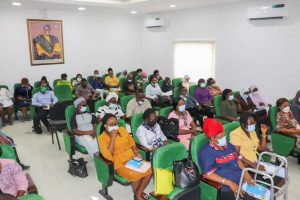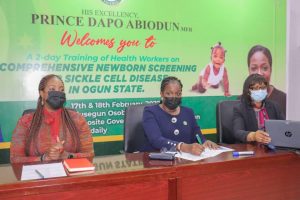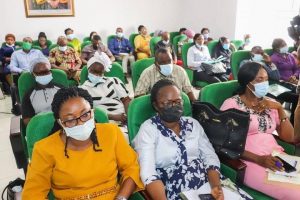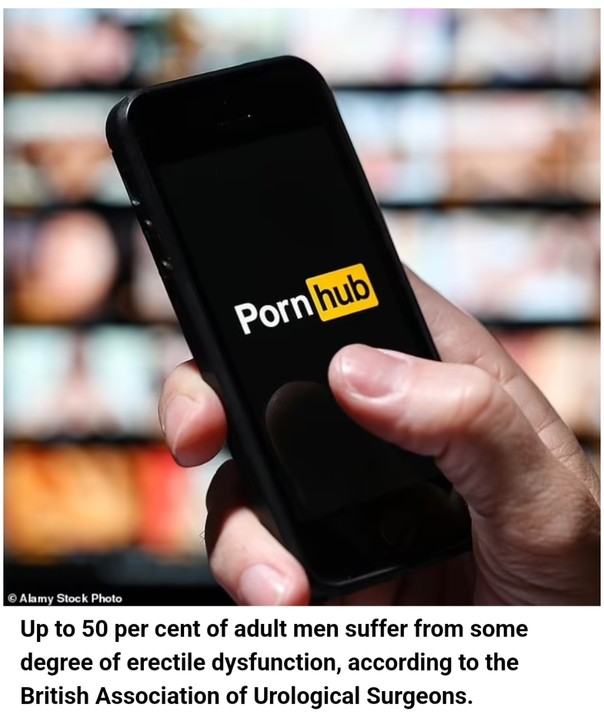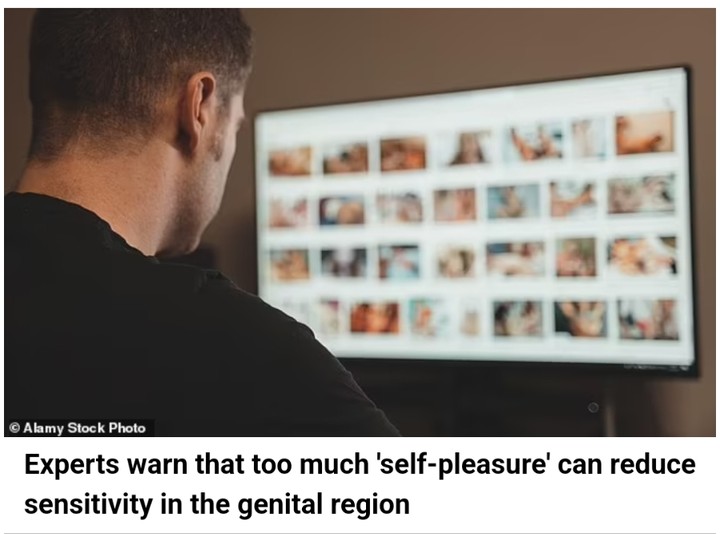Health/Beauty
INFANT MORTALITY: GO FOR TEST BEFORE MARRIAGE, HEALTH COMMISSIONER ADVISES INTENDING COUPLES
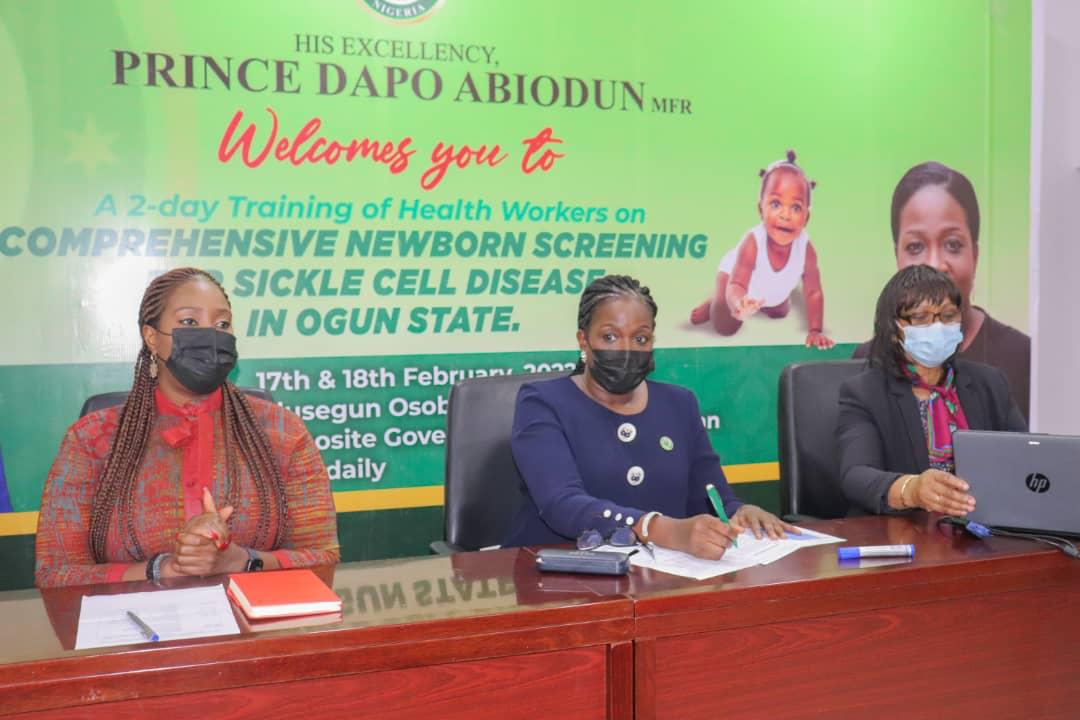
INFANT MORTALITY: GO FOR TEST BEFORE MARRIAGE, HEALTH COMMISSIONER ADVISES INTENDING COUPLES
Ogun State Commissioner for Health, Dr. Tomi Coker, has advised intending couples to go for screening to determine their blood status before tying the knots to guide against having children with sickle cell in the future.
Dr. Coker gave the advice when she declared open a 2-day training for Health Workers on Comprehensive Newborn Screening for Sickle Cell Disease in Ogun State, organized by the Ministry of Health in Abeokuta.
She disclosed that about 150,000 children are born annually in Nigeria with sickle cell disease with 90 percent mortality rate, making the country the world’s leading contributor to infant mortality from sickle cell disease.
“An estimated 150,000 babies are born annually in Nigeria with sickle cell disease. It is a heredity disorder that leads to death of 70%-90% infants before the age of 5. Sadly, Only a small portion of affected infants and children in Sub-Saharan Africa reach adolescence due to the gaps in our health system.”
“Very few of these children see their fifth birthdays. This is not acceptable for a disease which is preventable through early detection, appropriate interventions and management.
She however said 70% of deaths from the disease could be prevented with a low-cost diagnostic and treatment plan, disclosing that Governor Dapo Abiodun’s consistent investment in the health sector will contribute to a significant reduction in the burden of discorder such as sickle cell disease.
The Commissioner said that the workshop is the first comprehensive newborn screening for sickle cell disease programme in the State and part of government’s strategies to reduce under five mortality, expressing optimism of a success story regarding fight against sickle cell disease in the nearest furure.
“The workshop is in collaboration with partners to have a comprehensive reborn screening for the south west. Ogun State is the leading light in the south west and the first to embrace the screening programme which is the beginning of a statewide screening for the over 20,000 babies that are delivered in the State annually”, the Commissioner explained.
While noting that sickle cell disease is not a death sentence as it could be managed to enable the patient live a normal life to old age, Dr. Coker however enjoined parents, particularly interested mother’s who unfortunately have had babies born with the disease to take advantage of the screening programme which would be carried out in health facilities across the State.
The Director, Public Health Department, Ministry of Health, Dr. Festus Soyinka, in his opening remarks, said participants at the workshop would be exposed to the five components the newborn screening including testing, tracking, treatment, education and evaluation, calling on them to maximize the training opportunity given to them.
In her goodwill message, the Workshop facilitator and a Consultant Haematologist, Professor Norah Akinola, described the programme as a landmark event in South-West Nigeria that will end the tears of many mothers and families, appreciating the Ogun State government for prioritizing the health of the citizens.
Health/Beauty
Transforming Healthcare: RapidHeal Nigeria Offers Job Opportunities for 100 Certified Nurses Nationwide

Transforming Healthcare: RapidHeal Nigeria Offers Job Opportunities for 100 Certified Nurses Nationwide
Health/Beauty
Why Men Without Morning Erection Need Help
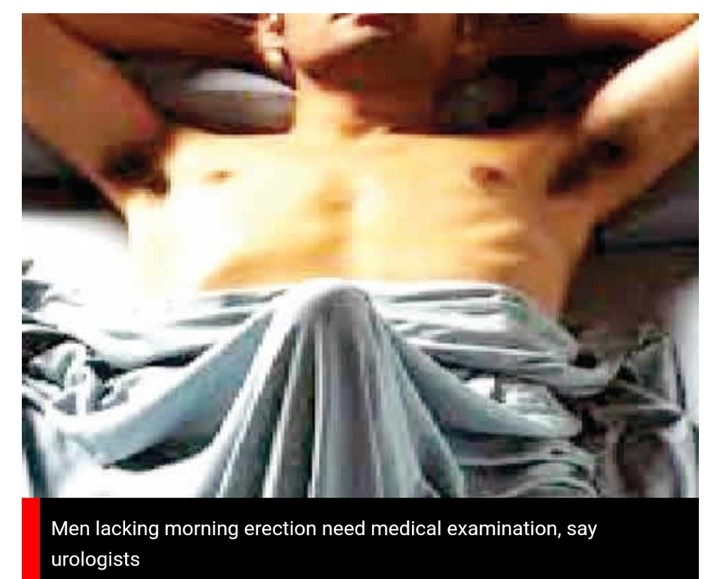
Why Men Without Morning Erection Need Help
Male reproductive health experts have urged men to take their sexual health seriously by seeking medical evaluation if they are not experiencing morning erections, a common and natural occurrence in healthy men.
The urologists stated that men experiencing persistent erectile issues or concerns should consult a healthcare professional for personalised evaluation and guidance.
Speaking exclusively with PUNCH Healthwise, the physicians advised men not having morning erections to carry out a comprehensive health assessment, including hormone testing, semen analysis, and lifestyle evaluations, to determine the underlying causes which may be erectile dysfunction or infertility.
According to Healthline, morning erections, a natural occurrence in most men, are often seen as a sign of healthy sexual function. They are typically caused by increased blood flow and hormonal fluctuations during the rapid eye movement (REM) phase of sleep.
The health website, however, noted that a notable number of men have reported experiencing a lack of morning erections, raising concerns about potential fertility or sexual health problems.
While some experts suggested that the absence of morning erection could be linked to underlying health issues, including infertility, others argued that it is not a reliable indicator of reproductive health.
A consultant urologist, Dr Emmanuel Eze stated that the body’s ability to have regular morning erections may be a reflection of broader reproductive health.
The physician stressed that the absence of morning erections could signal problems with hormone levels, such as low testosterone, or vascular health, which could affect overall erectile function and, in some cases, fertility.
Eze emphasised that morning erection is a natural occurrence during the REM sleep stage, typically happening 3-5 times per night.
The physician explained that the absence of morning erections could suggest issues such as erectile dysfunction, low testosterone levels, or underlying cardiovascular conditions.
According to him, it is normal for men to experience morning erections three to five times each night. These erections are typically spontaneous and occur without sexual arousal. The process is part of the body’s natural hormonal fluctuations and is linked to the functioning of the nervous system and blood flow.
Eze explained that these spontaneous erections during sleep are crucial in maintaining healthy erectile function and, by extension, overall reproductive health.
He emphasised that they are a natural and healthy sign of the body’s ability to achieve and maintain erections, which are important for male fertility.
“While occasional changes in morning erections are normal as men age, a persistent lack of them could point to potential health problems such as erectile dysfunction, low testosterone, or even more serious conditions like heart disease. Men mustn’t ignore these early warning signs.
“A comprehensive evaluation can help pinpoint the cause and allow for timely treatment options, whether it’s lifestyle changes, therapy, or medications,” Eze added.
Speaking further, the urologist elaborated that the absence of morning erections could be an indication of various medical conditions that might impact sexual and reproductive health.
“Erectile dysfunction is often the result of an imbalance in the body’s ability to deliver blood to the penis. If morning erections are absent, it could be a reflection of poor blood flow or nerve function, which are key contributors to erectile dysfunction,” Eze explained.
In addition to erectile dysfunction, the male reproductive expert noted that the absence of morning erections may also be linked to low testosterone levels.
He added, “Testosterone is the primary male sex hormone, essential for sexual function, mood regulation, and the production of sperm. A decline in testosterone can lead to a reduced frequency of morning erections. It can also cause a range of other symptoms, such as fatigue, decreased libido, and loss of muscle mass. While a decrease in testosterone levels is a natural part of aging, significant drops in testosterone could signal more serious health concerns.”
Eze also underscored the connection between erectile function and male fertility, stressing that problems with achieving or maintaining an erection could affect a man’s ability to conceive.
He explained that erectile function plays a critical role in sperm delivery, and when erectile issues arise, they could make it more difficult to engage in regular sexual activity, which could impact fertility.
“There is a direct connection between erectile function and male fertility. If a man is consistently not experiencing morning erections, it could indicate that there’s an issue with his reproductive system, whether it’s a problem with his hormones, blood vessels, or nerve function,” he said.
He pointed out that while the absence of morning erections does not automatically equate to infertility, it could signal underlying problems that should be addressed.
Eze advised that men who notice a persistent absence of morning erections should consult a urologist for an evaluation of their reproductive and sexual health.
He explained that poor blood circulation, which is often associated with heart disease or high blood pressure, can directly affect the ability to achieve erections.
“The vessels that supply blood to the penis are small and delicate, and when these vessels are compromised due to poor cardiovascular health, it can result in a decreased ability to have spontaneous erections.
“Erectile dysfunction is frequently one of the early signs of cardiovascular problems. If a man is not having morning erections, it could be a sign that his vascular health is not in optimal condition. It’s essential to recognise this as a potential red flag and seek medical advice before the issue becomes more severe,” the urologist warned.
However, a Senior Registrar in Urology at the Lagos State University Teaching Hospital, Dr. Akpo Edewor, argued that the lack of a morning erection is not necessarily an indication of serious health concerns, as many people assume.
Edewor emphasised that the absence of morning erections is not an automatic sign of erectile dysfunction or serious sexual health problems.
He explained, “Morning erections should not be viewed as the definitive measure of sexual health. It is important to understand that men can still maintain erectile function despite not having morning erections. This does not immediately indicate erectile dysfunction.”
The urologist stressed that various factors, such as sleep patterns, stress, or even the time a man wakes up, can influence whether or not he experiences a morning erection.
He further clarified that a key component in assessing erectile health is the ability to achieve an erection in response to sexual stimuli.
“If a man can still attain an erection when engaging with a partner, even without morning erections, this indicates that his erectile function is likely intact,” he stated.
Erectile dysfunction, according to Edewor, is more complex than just the absence of morning erections. It is a condition where a man consistently struggles to achieve or maintain an erection sufficient for sexual intercourse.
He said various health conditions, including heart disease, diabetes, hypertension, and even the medications used to treat these conditions, could contribute to erectile dysfunction.
Health/Beauty
Doctor Warns On The Danger Of Excessive Masturbation

Doctor Warns On The Danger Of Excessive Masturbation
A British doctor has warned that excessive masturbation is behind the rise of male health problems.
In moderation, self-pleasure helps to reduce stress, and improve sleep quality and mood, but it can become ‘an unhealthy habit’ and trigger a form of erectile dysfunction, says Dr Donald Grant, GP and senior clinical advisor at The Independent Pharmacy.
‘Overall, there’s no strict rule or guideline on how much people should masturbate.’
‘But when masturbation gets out of hand, there’s a variety of ways it can impact sexual and physical health.’
A key concern is the rise of porn use: half of adults in the UK now access graphic material online, according to a recent survey by media watchdog Ofcom, and Dr Grant links this to the rise in porn-induced erectile dysfunction, or PIED.
Up to 50 percent of adult men suffer from some degree of erectile dysfunction, according to the British Association of Urological Surgeons. It is often associated with obesity, high blood pressure, high cholesterol, and diabetes but can also have no obvious cause. One lesser-known culprit could be PIED, claims Dr Grant.
‘PIED is a type of erectile dysfunction that stems from an unhealthy consumption of pornography.
‘This unhealthy porn usage can lead to desensitisation, making it more difficult for men to achieve and maintain an erection — as they’re used to more intense sexual activity seen on screen.
‘It can lead to reduced interest in sex with actual partners as men prioritise porn and masturbation instead.’
More worryingly, Dr Grant warns that compulsive masturbation could trigger physical changes that affect intimacy.
‘Compulsive masturbation can lead to reduced sensitivity in the genital area, making it more difficult to achieve sexual pleasure or stimulation.
‘It can occur when nerve endings become damaged from too much activity, creating a loss of sensitivity.
‘This can also impact individuals who masturbate too roughly, causing potential friction damage.
‘Thankfully, this is a short-term issue and factors such as taking breaks or utilising lubricants can help restore sensitivity.
‘And thankfully, there are a range of treatments available to men who are struggling with ED, helping them manage a healthy sex life and achieve erections with ease.’
Dr Grant added that ‘over-masturbating’ can be damaging in other ways.
It can cause men and women to become ‘hyper-focused on their own pleasure, meaning when the time comes for sexual intercourse with a partner, individuals could experience performance anxiety, which directly impacts sex drive.’
The question of how much is too much is subjective, he admitted.
‘Masturbation habits can differ largely from person to person with some people doing it daily, weekly or not at all.
‘It’s important to monitor the sexual activity to ensure it doesn’t interfere with social lives, work or relationships.
‘Additionally, discomfort or injury is usually a telltale sign that the masturbation sessions are becoming too much and harming health.
‘It’s important to maintain a healthy but sensible sex life through masturbation, ensuring it’s not at the expense of daily activities.
‘Some people can even experience mental distress due to guilt or shame relating to their masturbation — this can stem from porn usage or other factors, but can have a big effect on people’s mental well-being.
‘Overall, common sense is required to ensure it remains a recreational activity without interfering with other aspects of daily life.’
-

 celebrity radar - gossips6 months ago
celebrity radar - gossips6 months agoWhy Babangida’s Hilltop Home Became Nigeria’s Political “Mecca”
-

 society6 months ago
society6 months agoPower is a Loan, Not a Possession: The Sacred Duty of Planting People
-

 Business6 months ago
Business6 months agoBatsumi Travel CEO Lisa Sebogodi Wins Prestigious Africa Travel 100 Women Award
-

 news6 months ago
news6 months agoTHE APPOINTMENT OF WASIU AYINDE BY THE FEDERAL GOVERNMENT AS AN AMBASSADOR SOUNDS EMBARRASSING


